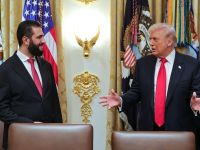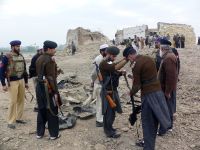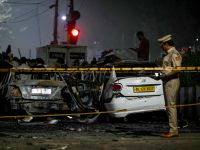Arab leaders at an emergency summit here Saturday leaned toward limited action against Israel, as five more Palestinians died and at least 200 were wounded in clashes with Israeli troops.
Violence flared throughout much of the West Bank and Gaza Strip following the funerals of nine Palestinians killed Friday. Four teenagers and a 32-year-old taxi-driver, all hit by live rounds, were the latest dead.
The confrontations followed calls by major Palestinian groups -- including Palestinian leader Yasser Arafat's Fatah movement -- to support the intifada, or uprising, despite Israeli Prime Minister Ehud Barak's threat to suspend the peace process if violence did not subside by the Arab summit's closure Sunday.
In Cairo, Arafat delivered a fiery speech before the Arab leaders, warning that "the collective massacre" of his people by Israel could spark "wars of religion."
"The Al-Aqsa (mosque) intifada will continue and it will win," Arafat later told Egyptian state television. "Jerusalem will remain Arab."
Arafat's comments appeared to bin a US-brokered truce with Israel announced Tuesday at an international summit in Egypt, which aimed at ending three weeks of Israeli-Palestinian bloodletting in which 128 people have now died, the vast majority of them Palestinians.
Israel swiftly denounced Arafat, calling his speech "very extreme with baseless, provocative allegations towards Israel."
"He raised some doubts about the readiness of the Palestinian leadership to take action in order to stop the violence. It looks now very clear that Arafat is not going to implement the Sharm el-Sheikh agreement," government spokesman Nachman Shai charged.
But Israel acknowledged that some Arab leaders in Cairo were "calling for responsible and positive attitudes in the current situation," singling out Egyptian President Hosni Mubarak, the summit's host, for his moderation.
"It is very important to hear that President Mubarak is committed to the peace process," Shai said.
The Arab leaders at their summit appeared to be moving to tone down a draft document that had urged certain Arab states to break ties with Israel. The new version would allow country to decide on its own measures.
Libya, which had been pushing for a complete rupture of ties with Israel, walked out of the summit, releasing a statement complaining the summit "would take no concrete decision likely to end Israel's aggressive practices."
Tripoli was represented at the summit by its permanent delegate to the Arab League after leader Moamer Kadhafi decided to boycott the talks.
In a surprise at the summit, Saudi Crown Prince Abdullah bin Abdul Aziz launched a rare tirade against longtime ally the United States, saying Washington as a sponsor of the Middle East negotiations assumes "particular responsibility in the collapse of the peace process."
"The sponsor is supposed to hold to account those responsible for such a collapse," he added, referring to Israel.
And Iraqi President Saddam Hussein, through his second in command Ezzat Ibrahim, called at the Arab summit for a jihad (Muslim holy war) to free Israeli-occupied lands and blasted "backward" Arab rulers.
Arab foreign ministers gathered late Saturday to smooth over differences over the summit's draft document. An Arab official said the document might be modified in light of Barak's threat Friday of a "time-out" in the peace process.
Although Israel has left some room for manoeuver, the Israeli spokesman said Saturday the stance had been well-decided.
"Of course, if the Arab summit will come up with some statement and the Palestinians will suddenly stop the violence that would be very helpful, but it doesn't look like it," Shai added.
Israeli Justice Minister Yossi Beilin, one of the main architects of the 1993 Oslo peace accords, came out in opposition to Barak, saying the "time-out" could harm the Jewish state.
"It is a serious error for us to pause the peace process," Beilin told Israeli public radio. "The peace process is not a basketball match and does not have time-outs."
Meanwhile in the Gaza Strip, 13-year-old Mohammed al-Najjar was pronounced clinically dead after he was shot in the head in clashes with Israeli troops protecting a Jewish settlement.
In the divided West Bank town of Hebron, taxi-driver Fayez al-Qeimari died of his injuries after being struck by a bullet while cleaning his vehicle close to where a clash was occurring, according to witnesses.
At Ramallah, Majed Ibrahim Hawamdah, 15, died after being struck by a live round, hospital sources said. More than 40 people were wounded in the clashes.
Among the wounded at Ramallah was Jacques-Marie Bourget, a journalist for the French magazine Paris-Match who was hit in the left lung, said Thierry Esch, a photographer with him.
A 17-year-old Palestinian was shot dead near the West Bank town of Jenin.
Earlier in the day Israel rejected a UN General Assembly resolution voted by a large majority to condemn what it called Israel's excessive use of force against Palestinian civilians.
The non-binding resolution condemned "acts of violence, especially the excessive use by the Israeli forces of force against Palestinian civilians" -- CAIRO (AFP)
© 2000 Al Bawaba (www.albawaba.com)







